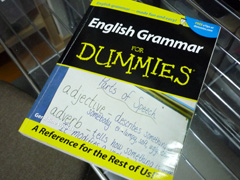
English Grammar for Dummies - 英語で英文法学習名前: 小川 邦久 リンク: http://kunisan.jp/ 日付: 2010年5月29日 
 ある日、ふと「英文法をまともに勉強したのはいつが最後だったかな…?」と考えました。大学4年で本格的に英語学習を始めた時に、英文法を半年ほどかけて勉強しましたが、それ以来まともにやっていません。その後、カナダの語学留学で英文法の授業がありましたが、それ程頭には入ってきませんでした。どちらにしても、15年ほど英文法の勉強から遠ざかっています。 ある日、ふと「英文法をまともに勉強したのはいつが最後だったかな…?」と考えました。大学4年で本格的に英語学習を始めた時に、英文法を半年ほどかけて勉強しましたが、それ以来まともにやっていません。その後、カナダの語学留学で英文法の授業がありましたが、それ程頭には入ってきませんでした。どちらにしても、15年ほど英文法の勉強から遠ざかっています。その間、アメリカの映画やドラマのDVDや、CNN ENGLISH EXPRESS、あと洋書を何冊か読むなどして、感覚的なところはある程度強化できたと思っています。しかし、2ヶ月程前に「久しぶりに文法の勉強をしてみてよう」と思い、「English Grammar For Dummies 「English Grammar for Dummies」は洋書なので、日本の英文法書とは違って、基本はネイティブの人のための英文法書です。ですので、日本語と英語の文法的な違いを意識させるような構成ではなく、「(ネイティブとして)どのような文法ミスが多いか」とか「どのような文章を書くとスマートに見えるか」などの内容が中心となります。例えば日本人が間違いやすい冠詞についての説明は、ほんの数行しかありません。多分、ネイティブの人は、冠詞で文法ミスを犯すことはほとんど無いのでしょう。 ここでは、この本を読んで、「今まで間違えてた」とか「へえ、そうなんだ」と思ったことをいくつか書いておきます。 -------------------- 誤: Grumpus is grouchy and a patron of the arts. 正: Grumpus is a grouch and a patron of the arts. ※andで繋ぐ品詞を揃える(名詞+名詞または形容詞+形容詞)。カンマとandで3つ以上並べる場合(XXX, XXX, and XXX)も同様。 誤: Little Jack Horner sat in the corner, and then pulled a plum out of his pie. 正: Little Jack Horner sat in the corner and then pulled a plum out of his pie. ※接続詞(and, but, orなど)は完全な文章を繋ぐ以外、直前にカンマを入れない。 ※ただし、3つ以上の言葉を並べる場合、"... XXX, XXX, and XXX ..."のようにカンマを入れることもある(入れなくても良い)。 例1(誤): I put nonfat yogurt into that soup; I like Stephen King's books. 例2(正): Grover was born in Delaware; he moved to Virginia when he was four. ※セミコロンは関連する二つの文章を接続する。二つ目の文章は一つ目の文章の付加的情報。 例1: I haven't seen the turkey since the ax came out of the box. 例2: Since you've been gone, I've begun an affair with Bill Bailey. ※becauseとsinceは同義で使われるケースが多くなっているが、sinceは「時間的理由」で使わるのが好ましい(将来は区別が無くなるかもしれない)。 文章の中でonlyの位置が変わるだけで、意味合いが大きく変わる。 例1: Only Lochness went to Iceland last summer. (彼以外は行かなかった) 例2: Lochness only went to Iceland last summer. (彼はアイスランドに行く以外何もしなかった) 例3: Lochness went only to Iceland last summer. (彼はアイスランド以外にも行けたのにアイスランドにしか行かなかった) 例4: Lochness went to Iceland only last summer. (彼は昨夏以外にもアイスランドに行く機会があったのに昨夏しか行かなかった。もしくはjustと同義語で「最近行ってきた」という意味合いを強く持つ) 誤: I'm sorry that somebody lost their bookbag, but I've lost my mind! 正: I'm sorry that somebody lost his or her bookbag, but I've lost my mind! ※somebodyは単数形なので所有格の代名詞も単数形でなければいけない。anyone、no one、everybody、nobody、eachなども同様。 誤: Fifty minutes are not enough for a television news show about Lochness. 正: Fifty minutes is not enough for a television news show about Lochness. ※時間、お金などはまとめて単数とみなす。ただし、複数枚の紙幣やコインなどを意味する場合には、複数として扱う。 例: Ludwig and Ludmilla's wedding ※二人の間の所有格は二人目の後に'sを付ける。"Ludwig's and Ludmilla's weddings"とすると、二人の別々の結婚式についての記述となる。 誤: "The equation that Agwamp wrote on the board is incorrect", thrilled Analivia. 正: "The equation that Agwamp wrote on the board is incorrect," thrilled Analivia. ※コンマはダブルクオーテーション内に入れる。 誤: You should: build a fire, arrest Lochness, sedate Lulu, and return to your grammar studies. 正: You should accomplish the following: build a fire, arrest Lochness, sedate Lulu, and return to your grammar studies. ※コロンで項目をリストアップする場合には、コロンの前の文章を完全な形にする。 誤: Lulu denied that she had more facial hair than him. 正: Lulu denied that she had more facial hair than he. ※比較対象が主語の場合には、thanの後の代名詞も主格になる(比較対象が目的語の場合にはhimとなる)。 誤: Ms.Belli told us that the earth was round. 正: Ms.Belli told us that the earth is round. ※「不変の事実」の場合は常に現在形を使う。 誤: Lulu put a ring into her pierced nose that she had bought last week. 正: Into her pierced nose Lulu put a ring that she had bought last week. ※先行詞と関係代名詞の間を置きすぎない。(最初の文章は「前の週に鼻を購入した」ことになる) 誤: Lochness put the paper into his pocket with atomic secrets wtitten on it. 正: Lochness put the paper with atomic secrets written on it into his pocket. ※前置詞と、関連する名詞の間を置きすぎない。 誤: To sew well, strong light is necessary. 誤: A strong light is necessary to sew well. 正: To sew well, you need a strong light. ※最初の二つの文章は主語が明確ではない。 誤: To intensely captivate 正: To captivate intensely ※「To + 動詞の原形」の間に副詞は入らない(ただし、このルールは無視されつつある)。 誤: Lodwig polished the diamond engagement ring, rechecked the certificate of authenticity, and was completely demolished when his intended bride said no. 正: Lodwig polished the diamond engagement ring, rechecked the certificate of authenticity, and cried like a baby when his intended bride said no. ※一つの文章の中に能動態と受動態を混在させない。 誤: Everybody loves somebody sometimes because all you need is love. 正: Everybody loves somebody sometimes because all anybody needs is love. ※一般的な人々を意味するyou、they、everybodyなどは、文章内で人称を混在させないようにする。 例1: Either Ludwig or his ex-wives live in a castle. 例2: Either his ex-wives or Ludwig lives in a castle. 例3: Does either Ludwig or his ex-wives live in a castle? 例4: Do either his ex-wives or Ludwig live in a castle? ※eitherで複数形と単数形が混在する場合には、動詞に近い名詞に合せて動詞が変化する。 誤: Lola has always been interested in archaeology because she thinks they spend a lot of time in the dirt. 正: Lola has always been interested in archaeology because she thinks archaeologists spend a lot of time in the dirt. ※最初の文ではtheyが指す先行詞が明確ではない。 誤: The orange dye looks horrible, and the cut looks as though it were done with pinking shears. This persuaded Lola to attend the dance wearing her purple wig. 正: Because the orange dye looks horrible and the cut looks as though it were done with pinking shears, Lola decided to attend the dance wearing her purple wig. ※最初の文のthisは17個もの単語群を指している(ただし、口語では問題ない)。 誤: The orchestra insures their instruments with Lloyds of Tepeka. 正: The orchestra insures its instruments with Lloyds of Tepeka. ※orchestraは単数形なので、所有代名詞も単数形のits。 -------------------- もちろん、「English Grammar for Dummies」にはこれ以外にもたくさんの例文が掲載されていて、文法を理論や理屈からだけではなく、より感覚的に理解出来るように解説されています。英語を教えているような人にも勉強になるのではないかと思います。 英語学習関連記事(リンク一覧): Duolingo - 初心者向け外国語学習アプリ / 4か月ぶりのTOEIC L&R(オンラインIP)で初のリーディング満点 / インテリ君の英語遊び TOEIC®英単語・英熟語 - プチコン4で英語学習ゲーム / 1年ぶりのTOEIC L&R(オンラインIP)とリーディング力の実力低下 / TOEIC L&R TEST 出る単特急金のフレーズとYouGlish / ...(記事連続表示)

最近の記事: ドレドの花摘みゲーム - プチコン4で「ヘッドオン」インスパイアなシンプルアクションゲーム / 直腸肛門周囲膿瘍(痔瘻)の根治手術で入院 / 神崎君のアドベンチャーランド - プチコン4で横スクロールアクションゲーム / ロジクール ワイヤレスマウスキーボードセット(無線) MK270G / コンクリートゲーム2 - プチコン4で「崩す」ゲーム / Duolingo - 初心者向け外国語学習アプリ / 老眼鏡を購入 / 東京競馬場の指定席で初観戦 / スターバックスコーヒー エミオ石神井公園店 / インテリ君の英語遊び 経営・管理部門編 - プチコン4でビジネス英語の学習ゲーム
■ ホームへ
|

